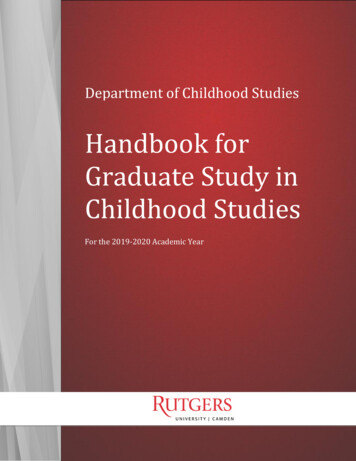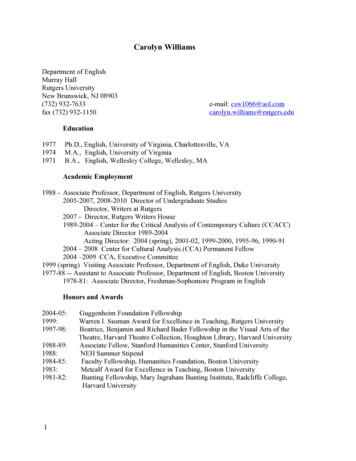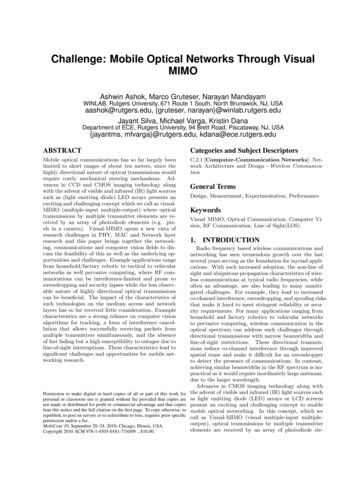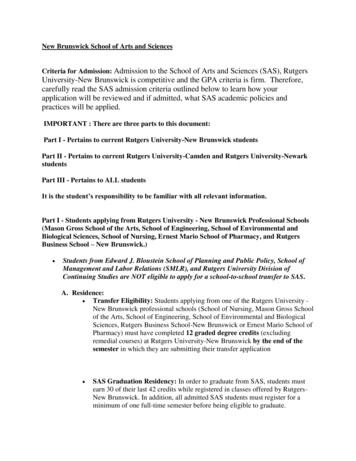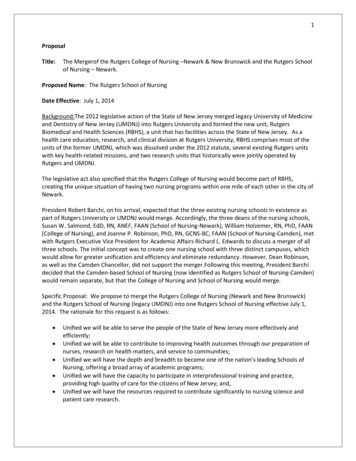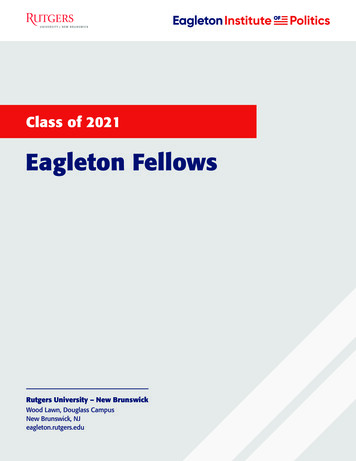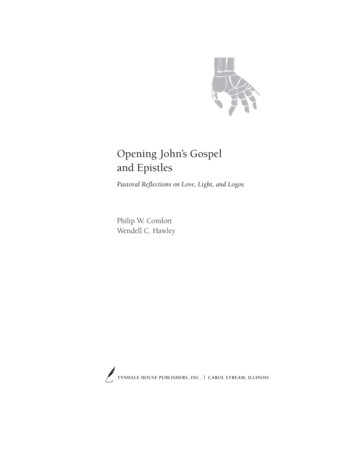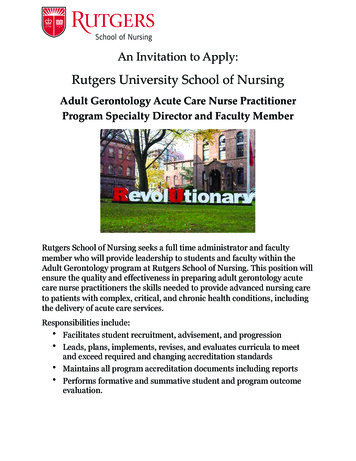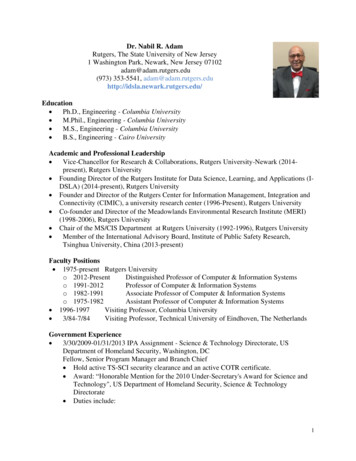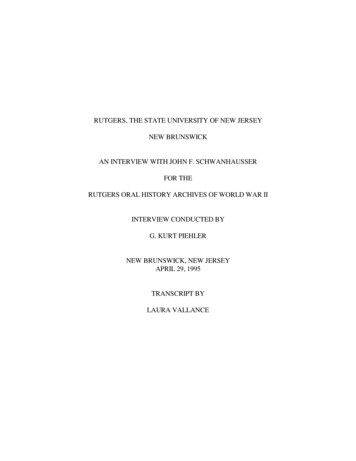
Transcription
RUTGERS, THE STATE UNIVERSITY OF NEW JERSEYNEW BRUNSWICKAN INTERVIEW WITH JOHN F. SCHWANHAUSSERFOR THERUTGERS ORAL HISTORY ARCHIVES OF WORLD WAR IIINTERVIEW CONDUCTED BYG. KURT PIEHLERNEW BRUNSWICK, NEW JERSEYAPRIL 29, 1995TRANSCRIPT BYLAURA VALLANCE
Kurt Piehler: This begins an interview with Mr. John F. Schwanhausser on April 29, 1995, atRutgers University in New Brunswick, New Jersey. I would like to begin by asking you a fewquestions about your father, who graduated from Rutgers in the Class of 1915. Why did your fatherchoose Rutgers? Do you know why?John Schwanhausser: Oh, yes, very much so. My father was a member of a very strong, Germanfamily. His father had come over in 1869, and my father had wanted to be a doctor, and he went toColumbia for a year, and then, my grandfather purchased the Charles Beseler Company and decidedthat my father was to become an engineer. So, my father was sent to Rutgers to become anengineer, to work in the Charles Beseler Company, which he, very obediently, did, and ended up asa partner of Charles Beseler.KP: How large was the Charles Beseler Company when your grandfather purchased it?JS: Very, very small, probably only a dozen to fifteen employees, and my father worked throughoutthe Depression years there, and he had a brother, who really wasn't very capable, who was supposedto go out and get the business. My father ended up doing almost everything with it, and,somewhere along the line, he ran into a man who had money and wished to invest in my father'stalents, and he put him with another man. They got rid of my uncle, who really wasn't doinganything, and another man came in, and this partnership prospered. During the war, [they] madeprojection apparatus and had all sorts of Vu-Graphs, and Vu-Lights, (trademark names of Beseler)and projection apparatuses in all the services. It was a big improvement for my father to do that. When he retired from the company, it was in the range of two hundred employees.KP: What did your father tell you about Rutgers? Did he want you to go to Rutgers?JS: Yes, he certainly did. As I grew up, my talents were in math and the sciences, much more sothan anything else, inherited, probably, but, he always said that, "Well, if you can't make up yourmind to do anything else, go take engineering. At least it'll teach you how to think," and so, therewasn't much doubt that I was going to go to college, the only question was, "How are we going topay for it?" and, fortunately, I was able to get a full tuition and fee scholarship in 1942, and so, Icame to Rutgers. I was pledged Chi Psi before I graduated from high school and things were sort ofset up, you might say, for me, my brother having been here and graduated in 1941 before me. Itwas sort of an accepted thing, right from the beginning.KP: Why did your brother go to Rutgers?JS: Similar reasons, similar thinking.KP: Did your father ever attend reunions?JS: Yes, yes. He was very active in the Class of '15, and he used to come back, oh, if not everyyear, certainly every five years, and would always love to come back and see his friends, not allof whom were Chi Psis, but, some of them were, but, he had established a freshman relationshipwith a bunch of people. He lived in Winants Hall, and he knew a whole bunch of people in the2
class, and he was, number one, the president of Chi Psi, but, he still kept up his otherassociations. He was in the Glee Club. He didn't sing, but, he played the mandolin, and, back inthose days, it was a mandolin and glee club, and so, he was in that.KP: How did your father's business fare in the Great Depression? You mentioned that money wastight when you were looking at colleges.JS: Oh, yes, it was very difficult in the Depression. What it was, was basically, it was lanternslides. You may recall the old three-and-a-quarter-by-four lantern slide machines and, basically,what it was, was a company to manufacture the projectors for this. My father was at variousexpositions. He had several exhibits that he designed and built in the New York World's Fair in1939, and the igloo and the Carrier building [Carrier Igloo of Tomorrow] and some of the others, hedesigned and did that, and that was simply because the lantern slide business really didn't havemuch going for it in those days. That was kind of a frill that people could do without, so, therewasn't an awful lot of business in that. So, he found other ways. He was a marvelous projectionist,during the war. He then became interested in opaque projection. He'd always had an opaqueprojector, but, this was very important to the Armed Services, because they wanted to be able to putany kind of copy in a machine and project it, and my father, I remember him spending nightsdeveloping mirrors, and silvering mirrors, and designing projection systems, to build theseopaque projectors for the service.KP: The war came along at a crucial time for your father.JS: Yes, it certainly did, right, it certainly did. Things were not going very well and the waryears made the operation profitable. Actually, the Beseler Company still exists today. In fact, my father designed and built an enlarger, which is considered to be the Cadillac of enlargers bymany photographic organizations. When I go into stores and ask them if they carry the BeselerProjector or the Beseler Enlarger, they say, "Well, yes, but, that's a marvelous piece ofequipment." KP: It is still viewed as the standard.JS: Oh, yes. I'm very proud of my father's achievements in this way. He probably, in his time,knew as much about opaque projection as anyone in the country.KP: Did your father envision that you and your brother would join the company?JS: Yes. He thought that perhaps we might and that was a consideration. However, in 1949, whenI graduated, there weren't too many jobs to be had. I had a cadet program with Public Service,Electric & Gas and I took it, simply because I didn't have any other offers. I wanted to get married,and so, I took it with the idea that that would get me started, and then, I would move over,possibly into my father's business or possibly into another kind of work. My brother had gotten ajob with GE and was deferred during the war, didn't have to go in service, as I did, because he wasworking on special kinds of street lighting, the idea was not to have too much light spill, but, atany rate, yes, we thought about it, both my brother and I. My brother was reasonably well satisfied3
with his work at GE. He became a traffic control specialist with GE, designing traffic controlsystems. My father's business partner was Jewish. He was a marvelous individual, but, he had ason that I really couldn't get along with very well, and I foresaw that I was not going to be able to becomfortable in that operation. So, I told my father that I thought that I would do just as well inPublic Service, Electric & Gas, and he accepted that. He understood exactly what I felt, and mybrother, effectively, said the same thing, so, yes, neither of us ever went in on it.KP: You could foresee problems, not so much with your father's partner, but, with his son.JS: My father's relationship with his business partner was excellent. They both understood andrespected each other's capabilities, and it was something that rescued my father from [the]oblivion of the 1930s, and they knew and understood [that] each other's abilities werecomplementary. The business partner's son, it was obvious to me, did not hold the same kind ofrespect for my father, or me, for that matter, and so, it just didn't seem [to be] the sensible thing todo, and my father was able to negotiate a very satisfactory settlement when he left the company.KP: When did your father leave the company?JS: Well, actually, what happened was, my father had prostate cancer, I forget when it wasexactly, in the early 1950s, and, when they operated on him, they called my mother, and my brother,and me, and said that there was very little they could do for him, and he had, maybe, three or fouryears to live. We never knew for sure whether he knew that, per se, and my mother didn't want totalk about it with him. However, it became apparent that, when we did not want to go in thecompany, he began to try to work his way out, but, he wasn't successful until, and you can putthis on the record, but, it's a little unusual. By that time, I was taking my Masters degree atRutgers-Newark, and, as part of that, it was important to set up a case, for a case history, and one ofmy courses was to set up a case, and I decided that I ought to be able to get sufficient informationfrom the books and things from the Beseler Company to do that. Well, my father's businesspartner wasn't very comfortable with that, because he thought my uncle, who had been a highexecutive in Worthington, was attempting to use me to get information about this company, andwould you believe that he offered my father a retirement at that point? He knew my father waslooking to leave, he knew that my brother and I really were not that interested, so, when I began topoke around in the finances of the Charles Beseler Company, I think his motive was to buy myfather off and stop me from poking around. So, he did and he offered my father a good [deal].He also, of course, knew that my father had had the cancer, so, he knew what the problem was, andso, anyhow, it seemed to work out, effectively, to our benefit, because my father, then, was able toretire and received enough compensation from that that my mother was well taken care of.KP: How did your parents meet?JS: My father and mother met at Lake Hopatcong. My grandfather used to rent a cottage atLake Hopatcong. My grandfather on my mother's side was a piano felt importer, and heowned a cottage just down the way, and they met and became friendly, and, well, she came downhere to Rutgers for a couple of dances and all that sort of thing, and so, they married shortly after hegraduated.4
KP: Your mother attended finishing school.JS: Yes, yes, right.KP: Did she ever talk about what she learned there?JS: No, not really. It was just exactly that. In those days, a rich, or well-off, not rich-rich,but, a well-off German family would look to send their daughter, rather than to college, in thosedays women didn't go to college, to, quote, "finishing school," and so, it was Brantwood Hall,and this was really like a super high school that would teach her all the social graces, and mymother did understand and have a good feel for what the social graces were.KP: Your father was Dutch Reformed and your mother was Lutheran.JS: Right.KP: Given your father's German background, how did he come to join the Dutch ReformedChurch?JS: I really don't know. All I know is that when we went to Maplewood, we found a DutchReformed church that my father seemed to be interested in. My father's mother died when he wastwo years old. He was brought up by his older sisters and I think they probably had as much todo with whatever religious affiliations he might have [as his parents]. I really don't know muchabout that.KP: Your father was born in Jersey City and lived there for a number of years and your mother wasborn in Hoboken. How did they come to settle in Maplewood?JS: Once again, my father did not want to stay in Jersey City. Shortly after I was born, mybrother was six years old when I was born, and they were renting, he felt they were a little tooclose to his father there, and I think my mother also wanted to get away from the Schwanhausserfamily influence, and so, they came and looked at a place in Maplewood, to buy, and, in 1926,bought the house in Maplewood. This, of course, was when the Charles Beseler Company wasdoing reasonably well, and, wouldn't you know, my grandfather, two years later, came out and alsobought a house in Maplewood, only two blocks away, so, it wasn't quite successful, in gettingaway, but, nevertheless, that's what happened. [laughter] KP: Which section of Maplewood did you grow up in?JS: Well, I think the best way to say that is, there were two sides of town, the east side of town, onthe east side of the railroad, and the west side of the railroad, which tended to be a little moreaffluent. In fact, in the '30s, the west side of town, where I lived, was known as the "charge andsend it" side of town, and the east side of town was known as the "cash and carry" side of town,rather than to make any other kind of distinction. You know, the area, in the 1920s, was being5
developed and, as I lived there, much more of the hillside became developed. So, yes, I lived in theJefferson School District, just down the street from Jefferson School, only half a block away, andabout half a mile from the center of the town of Maplewood.KP: How did the Great Depression affect your neighborhood?JS: Well, the Depression situation was such that if you could pay anything at all, even just intereston your mortgages, and everybody was pretty heavily mortgaged in houses, the banks wouldmuch rather have you continue to do that, rather than foreclose. So, we were able to keep upenough to pay interest, I guess, I don't know, I was fairly young at the time, but, almost everyonehad the same kinds of problems, some more than others, but, it tended to reduce our social life. Wehad very little social life. It was all that we could do to keep the house together and keep going, andso, some neighbors were more well off. I had a very good school experience, though, had a lot ofgood friends in school. KP: Were you active in elementary school and high school?JS: Yes, somewhat, right, yes. I was in band and orchestra, and I had been taking piano lessonsin the '30s, and the money ran out for that, and my mother called the piano teacher and said thatshe was going to have to reduce it to one lesson a week, rather than two, and, another six monthslater, she said that she could no longer keep it up, and the piano teacher was such that she decidedshe still wanted to keep teaching me, so, I went once a week in 1935, 1936, when I was in fifthand sixth grade. I continued with that. Maplewood had a very interesting arrangement. It was afairly affluent school system, South Orange and Maplewood together, and they had instruments thatthey had purchased over the years, and, if you could pay to take a Saturday lesson, you couldborrow an instrument from the school system and play, so, I did. I picked up a French horn, and Iplayed French horn throughout junior high school and high school, and that led, also, to mybeing able to blow the bugle, and that helped me get a job at Boy Scout camp as a counselor, asbugler, and then, I also used to spend my summers at Lake Hopatcong. My grandfather, by the timethe '30s [came], he had bought a cottage in Hopatcong and I used to spend my summers there.My folks would stay at home, but, I would go there and be with my grandfather and the two maidenaunts, incidentally, one of whom had also brought up my father. So, there, I learned water sportsand things, so, I became waterfront director at the Boy Scout camp, and I haven't mentioned it sofar, but, when I got in service, I was also bugler, and the bugler detail was very worthwhile, becauseit kept me out of a lot of KP duty, and it made me just a little bit different from somebody else, andso, I have never regretted taking those French horn lessons and changing over to bugle, and itwas very useful.KP: Were you a Boy Scout?JS: Yes.KP: What rank did you reach?JS: I was Eagle.6
KP: Did you attend the Washington Jamboree in 1937?JS: No, no. Well, I was too young at that time. I joined Boy Scouts in 1936 and I got Eaglein, I don't know, about 1940, somewhere in there.KP: You seem to have very fond memories of vacationing at Lake Hopatcong.JS: Yes.KP: Did your family travel at all in the 1920s and 1930s?JS: Very little, very little. There wasn't any money. My father and mother would come up, every other weekend, to Lake Hopatcong. They couldn't even afford to drive up every weekend,and they would come up every other weekend and spend the weekend with us, come up Friday andgo back late Sunday, and so, yes, I was, effectively, away from the family for eight weeks of thesummer, with the exception of the weekends.KP: You mentioned that the Maplewood school system was very good. What kind of expectationsdid your teachers have for you in terms of going on to college? Did the majority of the communitygo on to college?JS: Yes, yes, the majority in the community did go on to college, and there was, oh, I would say,maybe, twenty to twenty-five percent who did not. There were some less affluent sections of bothMaplewood and South Orange; the people there, most of them did not think that they would begoing on to college, but, by and large, the vast majority of kids in Columbia High went to college.KP: Attending Rutgers was, in some ways, a foregone conclusion for your father. Did youconsider going anywhere else?JS: Not seriously, especially after I got the State Scholarship. I mean, there wasn't any way I wasgoing to go anywhere else, [laughter] unless I was able to get some money for it, and I was not insports enough, or anything of that type, to get anything, so, I don't think there was ever any seriousconsideration of going anywhere else.KP: The State Scholarship was very competitive. I imagine that Essex County was one of the morecompetitive counties.JS: Yes, well, it was a statewide competition and I forget the numbers. I had always been able todo reasonably well in studies and classes and I graduated in the top ten percent of my class, and,here at Rutgers, I made Tau Beta Pi, as well, and, when I got my Masters degree, I also got BetaGamma Sigma. So, I've never had too much difficulty with schoolwork. I think I work at it, itdoesn't come easily, but, I work at it.7
KP: When you were growing up, in the 1930s, what did you know about what was going on inGermany? You had relatives in Germany. How much did you know at that time?JS: My grandfather used to rave and rant against Hitler and what he was doing. I had an auntwho married a German and who went back. This was, again, one of those aunts that brought myfather up when my grandmother died. She married a German national and went back to Germany,and she had a daughter who was significantly older than I, and we heard about everything thatwas going on in Germany through Tante Alice, Aunt Alice, who was over in Germany, and, in the1930s, this daughter came to visit us, so, I did meet her and see her at that time, and all I can say is,I really didn't have much personal understanding. I just know that my grandfather was veryunhappy that Hitler was raising this war machine and all that sort of thing, and, apparently, my AuntAlice felt the same way, but, of course, had to be very careful about what she said in Germanyabout that sort of thing, and she was also very unhappy with this cousin of mine, this older cousinwho came to visit, because she married a strict Prussian German who was a fencer, and he hadseveral fencing scars that he had gotten when he was in college and that sort of thing. So, I thinkmy Aunt Alice, Tante Alice, was unhappy with that marriage. Incidentally, the way I got back toGermany and the ones I was showing you pictures of before, in Schwan-Stabilo, a Germancompany run by relatives, my parents had gone back to Germany, but, this older cousin of minehad a daughter, and it was through that daughter that I reestablished contact this year. My oldercousin passed away in September of '93, but, I had her address, and I wrote to that address, in hopesthat one of her children would respond, and, fortunately, one did, and that's how we made thiscontact.KP: Your parents traveled to Germany.JS: Yes, they went back in 1954 for an extended trip.KP: Where do you think your grandfather's negative attitude toward Hitler came from?JS: Oh, I think from Alice, as much as anything. I think he saw that Hitler was not really goingto be good for the country, and I think a lot of Germans felt that way, but, they were sointimidated by the situation that they were afraid to speak out. They were, in effect, brainwashed,and Gunter Schwanhausser, the CEO of Schwan-Stabilo, we had some discussions about that,when I was over there, last fall, and he agreed that that was a lot of the problem. He said, "Theproblem was 'Nationaler Stolz,' (national pride). We were so unhappy with what had happenedin the First World War and the domination that the Allies had put on us that we fell for whatHitler was doing and we didn't realize how serious it was until we couldn't get out anymore." KP: When you were in high school, there were a number of debates over the level of Americaninvolvement in affairs in Europe and Asia. Do you have any memories of those debates?JS: No, no, not really. I don't have much memory of that, until, you know, December 1941changed all that, of course, but, up until that time, I don't recall that I had any great feel for thesituation. I don't think I was thinking in terms of whether I might become involved. I guess I mayhave even thought that if I was off in college, I might be deferred and wouldn't have to go in the8
service, as my brother had obviously become established when he graduated here in '41. AfterDecember 7, '41, that was a whole new ballgame and, of course, I was in my senior year in highschool at that point.KP: Where were you when you learned of the attack on Pearl Harbor?JS: Well, I got home from church, and it was on the radio, and we had not heard before we went,and I remember the radio announcement, and I've learned to distrust my mental images of whatthings were, because, when I've gone back, frequently, afterwards, I've found that things reallydidn't look like that, or what I thought they were, but, anyhow, I have this mental image of walking into the front hall of the house, and either my father didn't go to church, maybe that was it; I hadgone to Sunday school and came home from Sunday school and my father had the radio on and washearing all about the attack.KP: You had relatives in Germany during the war.JS: Yes.KP: How did your family feel about the outbreak of the war in Europe in September of 1939? Wasthere any contact with them through the Red Cross? Was there any concern about how they weredoing?JS: No, no. If I remember correctly, there was still some contact; there was mail. They wereable to get messages back and forth, and so, we knew, for instance, that Eugene, (pronounced"Urgain" in German) the guy with the scars, had been sent to the Eastern Front. We knew that hewas on the Eastern Front, so, communication, at least up until war was declared, was still possible. KP: What about after war was declared?JS: Well, then, of course, everything stopped. We didn't get anything. We didn't know what thesituation was. KP: When did you learn what had happened to the family, after the war?JS: Right. See, if you're an infantryman and you're fighting people, the family situation was notvery strong, ever. The German relatives had been over here in the '30s, but, we hadn't beenparticularly impressed with them, and Ergain, especially with his scars, you know, was kind of ascary individual. You didn't think much of him, and so, my grandfather kept up that association,because of his daughter, but, I guess my attitude was more of a writing-off, and then, afterhaving fought through two hundred days of combat, where you're getting shot at all the time, thoseGermans were the enemy. As I think I mentioned, somewhere along the line, I had an opportunity,at the end of the war, to go visit those relatives and, frankly, I didn't want any part of that. I was toounhappy with the time that had been taken out of my life and the hassles that I'd been put to with the9
service. All I wanted to do was get out, and get back, and get my education, and get married, andget back to normal. [laughter]KP: You were not ambivalent about fighting against the Germans.JS: No, no, not at all. I mean, it was unfortunate that the family was over there and was on thewrong side, but, I didn't have any feeling at all. They were the enemy and they were not permittingus to live the way we wanted to live. We obviously had to get rid of that cancer before we couldproceed, so, that's what we had to do.KP: In your childhood, did you speak German at all?JS: No, not in my childhood, but, I took German in, I guess, the sophomore and junior year ofhigh school, and I spoke enough to get by in Germany, not effectively, not fluently, but, I couldmake myself understood. It's a lot easier to make yourself understood than it is to understandsomeone who's speaking a language. I was always able to make myself understood, but, I wasn'talways able to understand what the Germans were saying to me.KP: Before you entered Rutgers in September of 1942, how had you seen the war changeMaplewood?JS: Well, for instance, I was in this military police reserve unit.KP: How did that come about?JS: That came about because I was a bugler, and they were looking for a bugler, and there weresome people who had been in Scouting who knew me and asked me to join it. The idea was thatif they were going to need help in case of any kind of an invasion or anything like that, they weregoing to need military police. So, it was kind of a patriotic thing to do, to join this military policereserve, and I guess I was either a sophomore or junior in high school when I got involved with that,and so, it was the bugle again. [laughter]KP: What did this reserve unit do? Were you just standing by for a possible invasion?JS: Right, right. They learned air raid techniques, directing traffic, that sort of thing, you know.KP: Do you remember any of the Civil Defense drills you participated in? Were there anyblackouts in Maplewood?JS: I guess we did, and there certainly were, and I do recall that we assembled a few times; thatwas part of what we had to do with the military police reserve. When there was a blackout called, we were supposed to assemble immediately in Maplewood Junior High School, which was rightnear the middle of town, and I think we did that several times. It's interesting you should ask. Frankly, I'd forgotten that, but, we did. We just got together in readiness.10
KP: Were there any scrap drives in Maplewood?JS: Well, I remember rationing, of course, but, I don't recall any scrap drives, particularly. Maybethere were, I don't recall.KP: How did rationing affect your family?JS: Well, gasoline, as much as anything, that was the biggest problem. You couldn't get enoughgas to go anywhere. It didn't really make too much difference to my father, because, by that time,we had had a 1930 Willys-Knight, and, by 1937, he couldn't operate it much anymore, anyhow.The problem with the Willys-Knight was, it was a sleeve valve engine, and it was very wasteful ofoil, and so, you put almost as much oil in as you did gas. Also, things, by 1937, had gotten verystiff and difficult, and, I remember, my brother was in Rutgers in '36 and '37 and had to go tosummer school, and he used the Willys-Knight to go to summer school, commuting fromMaplewood, here, to New Brunswick, and that's the last the car was ever used. Then, my fathersold it for scrap, yes, that's right. We also sold the piano that I had played, a grand piano, aSteinway, a beautiful piece of equipment, but, my mother decided she needed the money more thanshe needed the piano, sold that somewhere in about 1939 or thereabouts.KP: Did you visit your brother often when he was at Rutgers?JS: A few times, not too often. I, of course, knew about the fraternity and I had met a couple of his classmates and such, but, not very often.KP: Did you and your father go to the football games often?JS: We did go to the opening of the new stadium in 1937 and, maybe, one or two other gameswhen my brother was down here, but, once again, there wasn't an awful lot of funds for doing that,so, we didn't do much of that.KP: Did you work at all while growing up?JS: I went to camp for three weeks the first year, five weeks the second year, and eight weeksthe [third] year. The following year, my father made it plain that I wasn't going to be able to goto camp unless I got a job, and I got the job as bugler, which paid half the fee, at that time, so, I wasable to go for all that summer. The next year, I wasn't going to be able to pay anything at all, and Iput in for the waterfront job, and then, got the assistant waterfront director job at that point, whichwas full fee. In the senior year, the Boy Scouts were having trouble, so, I had both assistantwaterfront director and the bugling job, together, and did that, and, actually, for the last three weeksof that year, out of the eight week season, the then waterfront director got drafted, and I becamewaterfront director. So, I was bugler, waterfront director, assistant waterfront director, the works, and that year, I made some money. It wasn't a great deal, but, I did. The other way that I mademoney was, for both the junior and senior year, I was a laboratory assistant, working for a chemistryteacher in high school, who, by the way, was my Scoutmaster as well, so, that's how I got thatjob. I did lots of chores at home, you know, all of the leaf raking. [With] my grandfather, I11
would make some money every time leaves had to be raked and burned or snow had to be shoveled.I made some money there and I would also go around the neighborhood and make some moremoney doing that, too. So, as far as a large amount of money, no, but, I did well enough, andthe lab assistant job paid pretty well.KP: Did you ever work for your father's company?JS: Yes, I did. I worked for him for two summers, in the one immediately after the BoyScout time, and I worked in the factory. He put me to work, as
Rutgers University in New Brunswick, New Jersey. I would like to begin by asking you a few questions about your father, who graduated from Rutgers in the Class of 1915. Why did your father choose Rutgers? Do you know why? John Schwanhausser: Oh, yes, very much so. My father was a member of a very strong, German family.


